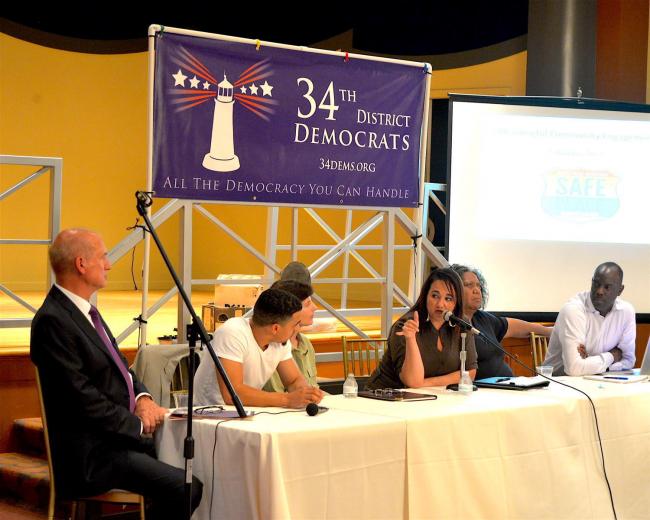34th District Democrats host discourse on police and racial profiling
Speakers on a panel discussion on police and communities of color, hosted by the 34th District Democrats, included (from left) King Country Sheriff John Urquhart, activist Bobby Alexander, retired judge Anne Levinson, who serves as auditor of the Office of Professional Accountability, Fe Lopez, executive director of the Community Police Association, and Sili Savusa, executive director of the White Center Community Development Association. Chris Porter, right, served as moderator.
Wed, 08/10/2016
By Lindsay Peyton
Fe Lopez, executive director of the Community Police Association, warned attendees at the 34th District Democrats’ regular meeting on Wednesday, Aug. 10.
“We can’t change things if you’re not willing to be uncomfortable,” she said. “And if you’re not uncomfortable today, we’re not doing our job.”
Lopez kicked off a panel discussion on police and racism. Guest speakers also included King Country Sheriff John Urquhart, retired judge Anne Levinson, who serves as auditor of the Office of Professional Accountability, Sili Savusa, executive director of the White Center Community Development Association and activist Bobby Alexander.
Chris Porter served as moderator. He shared his own experiences facing racism in the city.
Lopez said the topic is nothing new. What is different, however, is the ability of the public to capture incidents involving police and racial profiling with their cell phones, she explained.
“That changes what people see going on and how people are feeling in an easy, fast way,” she said. “That’s the shift we’re seeing.”
She said in 2010 a number of incidents were caught on video, which launched an effort in the city to address the problem.
A task force of 30 to 40 organizations worked together weekly to address policing issues in a nine-month period.
“What they did find was there was excessive use of force by police department,” Lopez said.
She said that the group did not report on discrimination in the way police addressed the community – but not because it wasn’t happening.
“The data didn’t exist,” she said.
The city of Seattle established the Community Police Commission to reach out, engage the community and make recommended changes to police policies and practices.
Levinson said while the city has taken steps in the right direction, more work remains.
“We were ahead of the curve in Seattle in setting up accountability mechanisms,” she said. “We owe it to ourselves to constantly improve the system we have.”
Levinson said the system should be fairer, as well as more transparent, open and accessible.
“It’s time for us to move from community-oriented policing to community-led policing,” she said.
Levinson added that law enforcement agencies have not traditionally been flexible, fluid or innovative – and outlined ideas to spark their evolution.
She advocated for the establishment of independent accountability systems.
“You want civilian oversight over criminal investigations,” she said. “You want a system that holds all individuals regardless of rank.”
Sherriff Urquhart admitted that a number of changes should be made in the police force.
“It’s the fault of the police largely that we are still having this discussion,” he said. “My force and the Seattle Police Department are too white and too male. Until we fix that, we will not have success in the community. There’s much more to do than that – but that’s where we have to start.”
Alexander said that when equality is not present in the police system, everyone is threatened.
“We know that the principal of justice has been eroded,” he said. “If I’m more likely to be detained, you’re not free either.”
Savusa said that citizens have to become more involved in decision-making
“One of the challenges we have is: are we bold enough to do something different,” she said. “The conversation has to shift. Let’s do something different. We get stuck in the system, because we don’t know anything else.”
Savusa said reaching out to members of the community is key to addressing the issue.
“You can’t go wrong if you make space at the table for the community voice,” she said.


